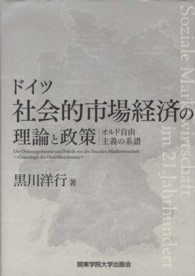Full Description
This book takes you on a journey into the future of ethical research, offering a collection of expert commentaries on the latest revision of the World Medical Association's cornerstone document, exploring its profound implications for global health ethics and proposing a path for its improvement. The book consists of three main parts, each focusing on key issues of human rights, integrity and inclusivity, with each chapter enriching the discourse on ethical research practices. The first part provides contextual perspectives on the implementation of research ethics, particularly in the Global South and Asia, by gathering revealing insights from different corners of the globe. This is followed by forward-looking perspectives for international ethical principles, and the final part describes not only the transformation of the Declaration, but also pushes it forward as a dynamic framework for ethical innovation to achieve access to health for all.
The 2024 Declaration of Helsinki could be marked by global discussions to be consolidated towards the highest ethical standards based on the experience of the COVID-19 pandemic, trends to promote the involvement of patients, participants and public in research projects, and the growing attention to data-driven research. Each chapter demonstrates the pathway to Ethical Innovation for Global Health.
The 2024 Declaration of Helsinki: Global Efforts Towards Highest Ethical Standards is essential reading for scientists, practitioners, and policymakers committed to the highest standards of ethical conduct in research. Members of research ethics committees, pharmaceutical company employees, medical students, patients and members of the public involved in human research will also find this volume useful.
Contents
Part 1 Research Ethics Perspectives from the Global South and Asia.- Chapter 1 Bioethics in Brazil to Overcome Pandemics: Striving for Highest Ethical Standards to Prevent Exploitation and to Achieve Health For All - A Case Study of the AIDS and COVID-19 Pandemics.- Chapter 2 Ubuntu Principles: Solidarity to Include Vulnerable Communities For Equitable Access.- Chapter 3 Strengthening Ethical Safeguards Protecting Vulnerable Populations in Egypt: Role of Research Ethics Committee.- Chapter 4 The DoH, the DoT, and the Duty to Participate in Data Research: A Case Reflection from Taiwan.- Chapter 5 Ethical, Legal and Social Issues of Biobanks Including Brain Banks: Experiences in South Korea, Taiwan and Japan and Future Perspectives for Global Principles.- Chapter 6 From COVID-19 to Global Standards: Redefining Korean Bioethics and Research Ethics.- Chapter 7 Scientific Misconduct and the Waste of Research Funding: Can Existing Ethical Principles and Legal Frameworks be Sufficient to Prevent Intentional Violations?.- Chapter 8 From Professional Freedom to Professional Autonomy: Ethical Principles for the Use of Unproven Interventions.- Part 2 Historical and International Perspectives.- Chapter 9 Bridging between the CIOMS and the WMA: Common Ground, Similarities, Differences, and Next Steps.- Chapter 10 Justice and Equity of Placebo-Controlled Trials: What Has Changed?.- Chapter 11 Post-trial Access as a Fundamental Right to Health: What Has Changed in the Implementation Principles?.- Chapter 12 Universities as Guardians of Ethics and Equity in Medical Research: Protecting the Rights of Vulnerable Populations, Ensuring Post-Trial Access, and Advancing Transparency in Clinical Trials.- Chapter 13 Patient Public Declaration of Research Ethics: Opinions and Proposals from Patients and the Public on Research Ethics.- Part 3 Alternative Frameworks of Innovation.- Chapter 14 Medicines Development for Global Health: The Evolution of IFAPP's Ethical Framework in the Ecosystem of the Life Sciences in a New World Order for Health.- Chapter 15 Ethical Principles for the Sustainable Development of Drugs for Neglected Tropical Diseases in Neglected Populations: Facilitating Meaningful Participation of Vulnerable People and Communities.- Chapter 16 Reformation of Global Research Ethics Principles from the Perspective of Patient Public Involvement.- Chapter 17 Global Efforts Towards the Highest Ethical Standards: Horizon For the Future.

![きょうりゅう えあわせカード [バラエティ]](../images/goods/ar2/web/imgdata2/40653/4065344506.jpg)






